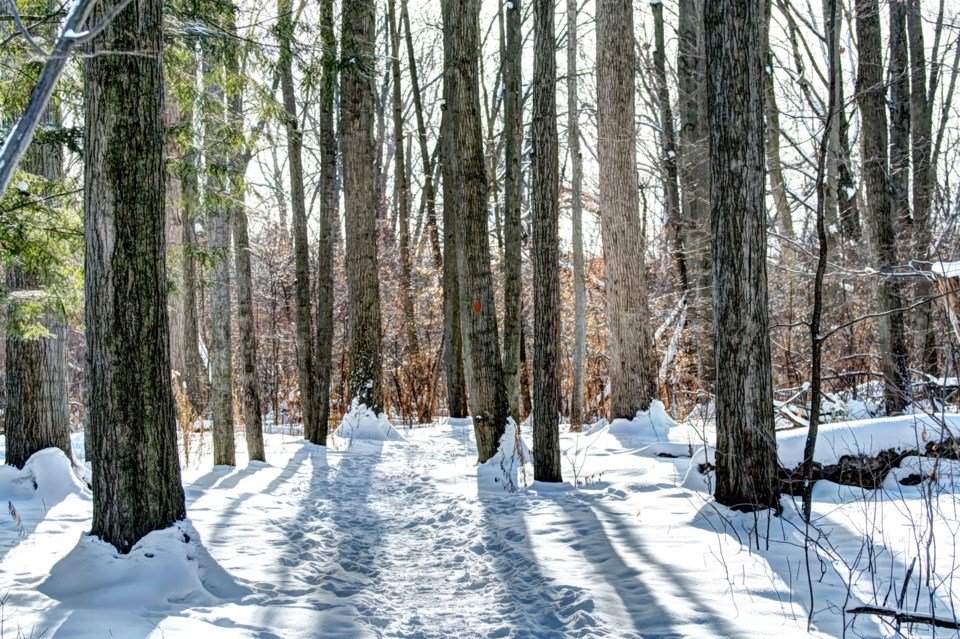Here we go again.
Another large snowfall is hitting parts of southwestern Ontario, on what has been by all accounts a mild winter season for the area, a never-ending cycle of snowfall and snow melt.
For humans, adaptability to changing weather conditions could be as simple as dressing for the conditions.
But for plants and animals, there are more factors at play, according to experts in the field.
"The effect of winter warming is going to be different for different species, depending on what they do for the winter," said Ryan Norris, a professor in the department of integrative biology at the University of Guelph.
The U of G has been studying Canada jays in Algonquin Park for the last 55 years.
"In that study, we've provided evidence that warming temperatures in the fall and winter are negatively affecting Canada jays by spoiling the food that they cache and rely on for the winter," he said.
While acknowledging his analysis is merely speculation in general when it comes to other species, Norris said the changes can also impact breeding cycles.
For the Canada jay, however, there was more emphasis on the importance of freeze-thaw events in the fall than winter.
Algonquin Park is the southernmost limit for the jay's breeding range, and the population has reportedly dropped by 50 per cent at the preserve, said Alex Sutton, a PhD student working with Norris at U of G. However, he added the bird's breeding range goes north from there, and is thriving across the country.
Norris said weather and climate events are becoming more severe, and it can have a "huge impact" on animals not producing a lot of young.
"To rebound from a bad year is difficult to do," he said in a news release. "This is another story in a long list of stories about how climate change is influencing wild animals.”
Norris said the lack of physical snow can also cause issues for a range of organisms.
"A lot of organisms use it for insulation, and that's like just ripping the insulation out from your walls of your house," he said. "It's going to be real uncomfortable. If the insulation is gone for too long, you'll just freeze."
Plants, more particularly those planted ahead of the winter season, can be similar.
"Snow's a good insulator," said Francois Tardif, a U of G professor specializing in weed biology.
"If we lose the snow cover, that's where plants can get in trouble."
The department has been experimenting with planting winter canola, which is usually planted in late August or early September, and harvested in the spring.
Some of them, he said, had to be planted later as they weren't able to get into the field, so the plant was a bit smaller and there were worries they wouldn't survive with a lack of snow cover.
He said ice causes issues too, comparing the freeze-thaw cycle's impact on plants to what it does to roadways. Tardif said when water gets into cracks on roadways, then expands and thaws multiple times, it causes concrete to break down over time, creating potholes.
"The same can happen in the field," he said. "It dislodges some of the plants."
Farmers, he added, will sometimes have to decide to sacrifice a crop like a winter canola, or part of it and plant a different crop, due to winter damage.
However, Tardif said you can't really generalize the impact of mild weather on plants, as individual plants have their own properties.
But he did recall stories of longtime gardeners in Toronto and Ottawa being able to grow plants they weren't able to before because of warmer winters.
"It depends on the magnitude," he said of the impact. "We've had these warm spells in the past, and the question is are (the warm spells) going to become more common, longer or warmer."
He said last winter was more of a normal winter, with sustained snow for longer periods and less stressful for plants, and if we go back to normal next winter, there won't be much of an effect.
"But if we start to see these warm spells longer," Tardif said. "That may eventually change the balance of species in fields in terms of the weeds we have."
